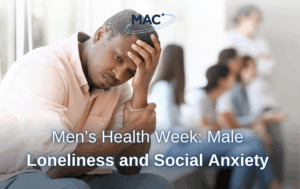As we observe Stress Awareness Month, it’s important to understand how stress can be a trigger to make symptoms of depression and Obsessive Compulsive Disorder (OCD) worse.
Stress is a widespread issue, in a UK survey, 74% of people said stress has made them feel overwhelmed and unable to cope1. In today’s busy world, stress is something many of us often deal with; it can creep into our daily lives, sometimes without us even realising it, and other times it can feel overbearing. While stress is a natural response to pressures, its effects can be particularly challenging for individuals living with existing mental health conditions such as depression and OCD.
What are depression & OCD?
Depression, often characterised by persistent feelings of sadness, hopelessness, and loss of interest in activities, is one of the most prevalent mental health disorders in the UK2. Similarly, OCD (which manifests through intrusive thoughts and compulsive behaviours), affects thousands of individuals in the UK3. While these conditions present themselves in distinct ways, they share a common vulnerability to stress4.
What is stress?
Stress is a natural reaction to pressure from demands or threats, and leads to physical, mental, and emotional changes. These changes are caused by the release of stress hormones like adrenaline and cortisol, which help prepare the body to confront or avoid the stressor (known as ‘fight-or-flight’). When stress hormones flood in, they throw off the brain’s balance5. Whilst some stress can be beneficial and help you through a challenging situation, prolonged stress or excessive stress can have negative effects on health and well-being. For people living with depression, stress can make them feel even more hopeless; it can amplify negative thought patterns, and intensify feelings of failure, guilt, and hopelessness.
For people living with OCD, stress can intensify obsessive thoughts and compulsive behaviours6. When experiencing stress, the cycle of intrusive thoughts can become more pronounced, driving individuals to more frequently engage in rituals aimed at easing anxiety. These rituals only offer temporary relief, continuing the cycle and strengthening the hold of OCD on a person’s life.
Stress also weakens the body’s defences against sickness, making people more likely to become ill7. If stress is constant, it can take a toll on physical health, which can affect mental wellbeing and exacerbate mental health conditions; it can become a cycle wherein feeling worse leads to more stress, and vice versa.
Strategies for managing stress and improving mental health in depression & OCD
Understanding the interconnected nature of stress and mental health conditions is crucial for effective treatment and management. By identifying our stress triggers and finding ways to deal with them, we can try to minimise the levels of stress we experience. Some strategies that may help are calming exercises such as meditation, staying active, eating a balanced diet, setting boundaries, and talking to friends for support.
Additionally, therapeutic interventions such as cognitive behavioural therapy (CBT) can equip individuals with coping mechanisms to navigate stressors more effectively8. CBT functions by reshaping these negative interpretations, thus altering the behavioural patterns they prompt. Moreover, it imparts the skills and cognitive strategies necessary for more effective coping with life’s challenges. Furthermore, nurturing a kind and empathetic atmosphere is crucial for assisting individuals coping with depression and OCD. Eliminating the stigma associated with mental illness is essential for fostering open communication and ensuring access to resources and support systems.
Research into new and improved treatments for mental health conditions
Here at MAC, we want to improve the quality of life for those living with depression or OCD by contributing to the development of more effective, better-tolerated treatment options through groundbreaking clinical trials investigating potential new treatments.
If you are currently living with OCD or OCD symptoms that impact your daily life and feel that your current antidepressant medication is not fully helping, you could be eligible to take part in the latest OCD clinical trial investigating a potential treatment that is thought to target a different signalling pathway in the brain to current OCD treatments. Eligible participants may receive up to £490 for their time and commitment to the study, along with reasonable travel costs. For more information on how you can get involved, visit our OCD Research page.
If you or a loved one is living with depression, you could help researchers investigate potential new treatments. Register your details to join our clinical trial database and we will contact you when a suitable trial becomes available. If eligible, you may receive financial reimbursement for your time and commitment to a study, as well as reasonable travel expenses and a full health check-up! To register your interest, visit our current trials webpage.
All our clinical trials are free to take part in, and you’ll receive a full health check-up from one of our trained medical professionals as part of the trial. If eligible to take part, you’ll receive travel expenses to and from our clinics. Depending on the research, you will also receive financial reimbursement for your time and commitment to the trial, if eligible.
1 Mentalhealth-uk – Stress and how to cope with it
2 Mentalhealth-uk – Stress and how to cope with it
3 Rethink Mental Illness – Obsessive-compulsive disorder (OCD)
4 National Library of Medicine – The overlap between anxiety, depression, and obsessive-compulsive disorder
5 National Library of Medicine – Stress and hormones
6 National Institute of Mental Health – Obsessive-Compulsive Disorder: When Unwanted Thoughts or Repetitive Behaviors Take Over
7 Cleveland Clinic – Yes, There Is Such a Thing as Stress Sickness
8 Verywell mind – CBT Coping Skills and Strategies






